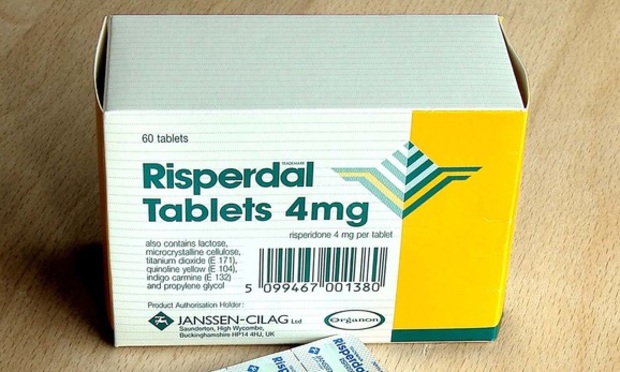$8 Billion Risperdal Verdict Reduced to $6.8 Million
The two-sentence order did not outline the reasoning for drastically cutting the $8 billion jury award but it brings the punitive damages award to 10 times the $680,000 compensatory award.
January 17, 2020 at 12:34 PM
4 minute read
The original version of this story was published on The Legal Intelligencer
 Risperdal. Photo: Housed via Wikimedia Commons
Risperdal. Photo: Housed via Wikimedia Commons
The judge who oversaw the first punitive damages trial in the Risperdal litigation has decided to slash the award to $6.8 million after a Philadelphia jury handed up a record-busting $8 billion verdict against Janssen Pharmaceuticals last fall.
Philadelphia Court of Common Pleas Judge Kenneth Powell granted the post-trial remittitur motion that Janssen Pharmaceuticals, a Johnson & Johnson subsidiary, had filed in the case Murray v. Janssen Pharmaceuticals. According to the docket, Janssen's post-trial motions were denied in all other respects.
Although Powell's two-sentence Jan. 17 order did not outline his reasoning for drastically cutting the $8 billion jury award, the decision brings the punitive damages award to 10 times the $680,000 compensatory award for plaintiff Nicholas Murray.
Murray's attorney, Thomas Kline of Kline & Specter, said he believed that, "when the merits are reviewed that the $8 billion will be reinstated."
"The ruling is wrong and will be appealed. It wipes out a valid award of a jury which met all of the parameters under the decisional law and constitutional guardrails. The remitted verdict provides essentially no punishment for the worst of the worst of corporate misconduct," he said in an emailed statement. "Further, this ruling defeats the purpose of punitive damages, which is to punish and deter. It incentivizes bad behavior and undermines the right to trial by jury."
In an emailed statement, Janssen said that, although the court "appropriately reduced the excessive punitive damages award, we will continue to move ahead with an appeal of this verdict."
"The company was precluded from presenting a meaningful defense due to the court's exclusion of key evidence," spokesman Andrew Wheatley said. "As a result, vital evidence as to how the label for Risperdal clearly and appropriately outlined the benefits and risks associated with the medicine was not presented to the jury for their consideration as they deliberated on the case."
Drinker Biddle & Reath attorney David Abernethy filed the post-trial motions for Janssen. New York attorney John Winter of Patterson Belknap Webb & Tyler and Ethel Johnson of Morgan, Lewis & Bockius, who is from Texas, tried the case for J&J.
The jury that oversaw the nearly month-long punitive damages trial ruled 10-2 on Oct. 8 to slam Janssen Pharmaceuticals with the multibillion-dollar verdict. The award was solely for punitive damages after the case initially came to a $1.75 million verdict by a separate jury, which was later reduced to $680,000.
A review of The Legal Intelligencer's archives showed the $8 billion award was the largest verdict in Pennsylvania since at least 1994, when the publication began tracking each year's largest verdict and settlement. The only higher award was part of a settlement hammered out in 2000, when Pennsylvania received $11.3 billion as its share of the nationwide $206 billion settlement to end tobacco litigation.
The verdict caught attention and headlines from across the country, but several attorneys told The Legal soon after the award came down that 25-year-old U.S. Supreme Court case law all but ensured the award would be reduced on appeal.
"There's not a hard-and-fast ratio to punitives, but the Supreme Court made clear it should have a rational relationship," defense attorney James Heller of Cozen O'Connor said. "Most courts look to three to four times."
Although, after the reduction, the punitive damages award still amounts to 10 times the compensatory award, what remains is less than one one-thousandth of what the jury initially awarded for punitive damages.
In the wake of the verdict, Richard Jurewicz of Galfand Berger, who represents plaintiffs in products liability cases, likened the litigation to a Roundup case that ended with a $2 billion punitive damages award, which was later reduced to $86 million. The California judge overseeing that case, which was against Monsanto, determined that the ratio between the $55 million compensatory award and the $2 billion punitive damages verdict was excessive.
The judge cited the 1996 Supreme Court case BMW of North America v. Gore, which said that when courts are trying to determine if a punitive damages award is "grossly excessive" courts should look to the degree to which a defendant's conduct is reprehensible, the comparison to other punitive damages awards and the ratio with the compensatory damages.
Powell's ruling clears the way for the appeal to move on into the state Superior Court.
According to court records, there are more than 7,000 Risperdal cases on the docket in Philadelphia.
This content has been archived. It is available through our partners, LexisNexis® and Bloomberg Law.
To view this content, please continue to their sites.
Not a Lexis Subscriber?
Subscribe Now
Not a Bloomberg Law Subscriber?
Subscribe Now
NOT FOR REPRINT
© 2025 ALM Global, LLC, All Rights Reserved. Request academic re-use from www.copyright.com. All other uses, submit a request to [email protected]. For more information visit Asset & Logo Licensing.
You Might Like
View All


First-of-Its-Kind Parkinson’s Patch at Center of Fight Over FDA Approval of Generic Version
3 minute read
Pharma Giants File Patent Infringement Suit Against India-Based Drugmaker Over IBS Medication
3 minute readTrending Stories
- 1South Carolina Physicians Challenge Abortion Ban Under Religious Freedom Claims
- 2Special Series Part 5: The State’s Bond Lock Impermissibly Delegates Legislative Authority
- 3President-Elect Donald Trump Sentenced to Unconditional Discharge
- 4JCPenney Customer's Slip-and-Fall From Bodily Substance Suit Best Left for a Jury to Decide, Judge Rules
- 5Products Liability: The Absence of Other Similar Claims—a Defense or a Misleading Effort to Sway a Jury?
Who Got The Work
Michael G. Bongiorno, Andrew Scott Dulberg and Elizabeth E. Driscoll from Wilmer Cutler Pickering Hale and Dorr have stepped in to represent Symbotic Inc., an A.I.-enabled technology platform that focuses on increasing supply chain efficiency, and other defendants in a pending shareholder derivative lawsuit. The case, filed Oct. 2 in Massachusetts District Court by the Brown Law Firm on behalf of Stephen Austen, accuses certain officers and directors of misleading investors in regard to Symbotic's potential for margin growth by failing to disclose that the company was not equipped to timely deploy its systems or manage expenses through project delays. The case, assigned to U.S. District Judge Nathaniel M. Gorton, is 1:24-cv-12522, Austen v. Cohen et al.
Who Got The Work
Edmund Polubinski and Marie Killmond of Davis Polk & Wardwell have entered appearances for data platform software development company MongoDB and other defendants in a pending shareholder derivative lawsuit. The action, filed Oct. 7 in New York Southern District Court by the Brown Law Firm, accuses the company's directors and/or officers of falsely expressing confidence in the company’s restructuring of its sales incentive plan and downplaying the severity of decreases in its upfront commitments. The case is 1:24-cv-07594, Roy v. Ittycheria et al.
Who Got The Work
Amy O. Bruchs and Kurt F. Ellison of Michael Best & Friedrich have entered appearances for Epic Systems Corp. in a pending employment discrimination lawsuit. The suit was filed Sept. 7 in Wisconsin Western District Court by Levine Eisberner LLC and Siri & Glimstad on behalf of a project manager who claims that he was wrongfully terminated after applying for a religious exemption to the defendant's COVID-19 vaccine mandate. The case, assigned to U.S. Magistrate Judge Anita Marie Boor, is 3:24-cv-00630, Secker, Nathan v. Epic Systems Corporation.
Who Got The Work
David X. Sullivan, Thomas J. Finn and Gregory A. Hall from McCarter & English have entered appearances for Sunrun Installation Services in a pending civil rights lawsuit. The complaint was filed Sept. 4 in Connecticut District Court by attorney Robert M. Berke on behalf of former employee George Edward Steins, who was arrested and charged with employing an unregistered home improvement salesperson. The complaint alleges that had Sunrun informed the Connecticut Department of Consumer Protection that the plaintiff's employment had ended in 2017 and that he no longer held Sunrun's home improvement contractor license, he would not have been hit with charges, which were dismissed in May 2024. The case, assigned to U.S. District Judge Jeffrey A. Meyer, is 3:24-cv-01423, Steins v. Sunrun, Inc. et al.
Who Got The Work
Greenberg Traurig shareholder Joshua L. Raskin has entered an appearance for boohoo.com UK Ltd. in a pending patent infringement lawsuit. The suit, filed Sept. 3 in Texas Eastern District Court by Rozier Hardt McDonough on behalf of Alto Dynamics, asserts five patents related to an online shopping platform. The case, assigned to U.S. District Judge Rodney Gilstrap, is 2:24-cv-00719, Alto Dynamics, LLC v. boohoo.com UK Limited.
Featured Firms
Law Offices of Gary Martin Hays & Associates, P.C.
(470) 294-1674
Law Offices of Mark E. Salomone
(857) 444-6468
Smith & Hassler
(713) 739-1250






